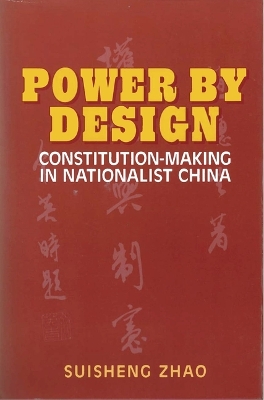First established as a cabinet system in Guangzhou in 1925, the Nationalist Government of China was replaced three years later by a presidential system under a unified Nationalist government in Nanjing. The cabinet government was restored in 1931 and existed until the presidential system was again installed by the 1936 constitution. Why did presidential and cabinet systems exist alternately during this formative period of the Nationalist government? Why was the presidential system finally adopted in 1936? Suisheng Zhao answers these and other questions fundamental to understanding authoritarian regimes in this pioneering study of the design of the Nationalist Government of China from 1925 to 1937. although scholars of comparative politics have shown great interest in the institutional choice between parliamentarianism and presidentialism in democratic countries, they have paid little attention to the study of constitutional frameworks in authoritarian settings. By offering a clear and original re-interpretation of the history of this power struggle between Chiang Kai-shek and his rivals over institutional design, Zhao challenges the conventional wisdom that has underestimated the importance of formal institutions in non-democratic regimes.Borrowing ideas from public choice theory, Zhao proposes that political actors who design governmental institutions are diven by power-maximization strategies just as business firms are driven by wealth-maximization strategies. Constitution-making reflects the underlying distribution of power among authoritarian leaders, who attempt to design political institutions that will consolidate their personal power and position. Thus, Zhao argues, if political actors possess more power resources than their rivals and anticipate themselves becoming dominant, they will choose the singular leadership of the presidential system. If they are in a weaker position and do not anticipate becoming dominant, they will prefer the collective leadership of the cabinet form of government.Notable for its persuasive integration of political science theory and the historical evidence, Power by Design is an insightful re-interpretation of Chinese history that will be welcomed by scholars of modern China and those interested in the consequences of the nationalist politics that continue to reverberate in contemporary Chine, as well as by comparative political scientists studying constitution-making and institutional design.
- ISBN13 9780824817213
- Publish Date 1 December 1995
- Publish Status Active
- Publish Country US
- Imprint University of Hawai'i Press
- Format Hardcover
- Pages 232
- Language English
